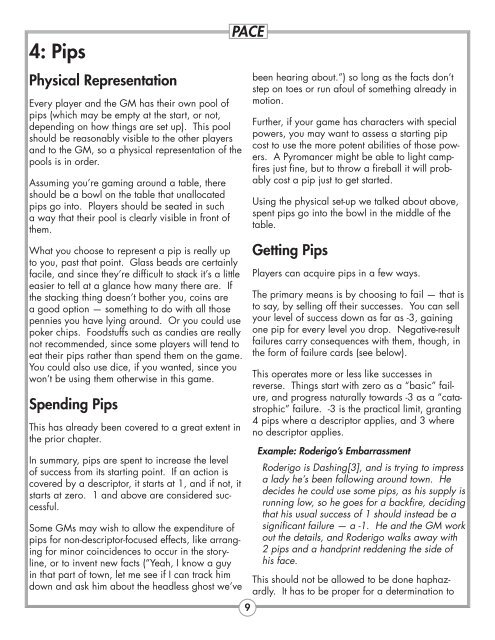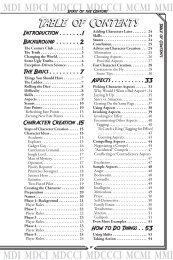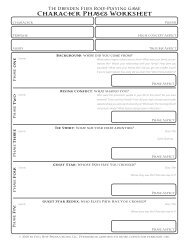Pace And Other Systemsâ¦.. - Evil Hat Productions
Pace And Other Systemsâ¦.. - Evil Hat Productions
Pace And Other Systemsâ¦.. - Evil Hat Productions
- No tags were found...
Create successful ePaper yourself
Turn your PDF publications into a flip-book with our unique Google optimized e-Paper software.
4: PipsPhysical RepresentationEvery player and the GM has their own pool ofpips (which may be empty at the start, or not,depending on how things are set up). This poolshould be reasonably visible to the other playersand to the GM, so a physical representation of thepools is in order.Assuming youre gaming around a table, thereshould be a bowl on the table that unallocatedpips go into. Players should be seated in sucha way that their pool is clearly visible in front ofthem.What you choose to represent a pip is really upto you, past that point. Glass beads are certainlyfacile, and since theyre difficult to stack its a littleeasier to tell at a glance how many there are. Ifthe stacking thing doesnt bother you, coins area good option something to do with all thosepennies you have lying around. Or you could usepoker chips. Foodstuffs such as candies are reallynot recommended, since some players will tend toeat their pips rather than spend them on the game.You could also use dice, if you wanted, since youwont be using them otherwise in this game.Spending PipsThis has already been covered to a great extent inthe prior chapter.In summary, pips are spent to increase the levelof success from its starting point. If an action iscovered by a descriptor, it starts at 1, and if not, itstarts at zero. 1 and above are considered successful.Some GMs may wish to allow the expenditure ofpips for non-descriptor-focused effects, like arrangingfor minor coincidences to occur in the storyline,or to invent new facts (Yeah, I know a guyin that part of town, let me see if I can track himdown and ask him about the headless ghost wevePACE9been hearing about.) so long as the facts dontstep on toes or run afoul of something already inmotion.Further, if your game has characters with specialpowers, you may want to assess a starting pipcost to use the more potent abilities of those powers.A Pyromancer might be able to light campfiresjust fine, but to throw a fireball it will probablycost a pip just to get started.Using the physical set-up we talked about above,spent pips go into the bowl in the middle of thetable.Getting PipsPlayers can acquire pips in a few ways.The primary means is by choosing to fail that isto say, by selling off their successes. You can sellyour level of success down as far as -3, gainingone pip for every level you drop. Negative-resultfailures carry consequences with them, though, inthe form of failure cards (see below).This operates more or less like successes inreverse. Things start with zero as a basic failure,and progress naturally towards -3 as a catastrophicfailure. -3 is the practical limit, granting4 pips where a descriptor applies, and 3 whereno descriptor applies.Example: Roderigo’s EmbarrassmentRoderigo is Dashing[3], and is trying to impressa lady hes been following around town. Hedecides he could use some pips, as his supply isrunning low, so he goes for a backfire, decidingthat his usual success of 1 should instead be asignificant failure a -1. He and the GM workout the details, and Roderigo walks away with2 pips and a handprint reddening the side ofhis face.This should not be allowed to be done haphazardly.It has to be proper for a determination to






